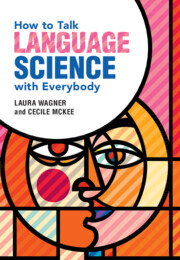Book contents
- How to Talk Language Science with Everybody
- How to Talk Language Science with Everybody
- Copyright page
- Contents
- Figures
- Preface
- Acknowledgments
- 1 Why Bother?
- 2 You Can Be the Expert
- 3 Cooperative Conversations
- 4 Conversational Goals
- 5 Know Your Audience
- 6 Creating Relevance by Generating Interest
- 7 Creating Relevance by Making Connections
- 8 Quality and Credibility
- 9 Quality vs Quantity
- 10 Learn to Listen
- 11 Information Structure
- 12 The Curse of Knowledge
- 13 Start with Examples
- 14 What’s New?
- 15 From Given to New
- 16 The Three-Legged Stool Approach
- 17 Working with a Range of Different Audiences
- 18 Where Can I Go?
- 19 Being a Good Partner
- 20 Finale
- Appendix Teaching with This Book
- References
- Index
1 - Why Bother?
Published online by Cambridge University Press: 17 May 2023
- How to Talk Language Science with Everybody
- How to Talk Language Science with Everybody
- Copyright page
- Contents
- Figures
- Preface
- Acknowledgments
- 1 Why Bother?
- 2 You Can Be the Expert
- 3 Cooperative Conversations
- 4 Conversational Goals
- 5 Know Your Audience
- 6 Creating Relevance by Generating Interest
- 7 Creating Relevance by Making Connections
- 8 Quality and Credibility
- 9 Quality vs Quantity
- 10 Learn to Listen
- 11 Information Structure
- 12 The Curse of Knowledge
- 13 Start with Examples
- 14 What’s New?
- 15 From Given to New
- 16 The Three-Legged Stool Approach
- 17 Working with a Range of Different Audiences
- 18 Where Can I Go?
- 19 Being a Good Partner
- 20 Finale
- Appendix Teaching with This Book
- References
- Index
Summary
Chapter 1 introduces the book’s structure and emphases, noting what is and is not directly addressed. It links successful science communication to two critical lessons from the language sciences and motivates the need for public engagement by experts in the language sciences. One lesson concerns cooperative conversations in which all parties listen to and learn from each other. Another lesson concerns information structure where familiar (given) information precedes unfamiliar (new) information. This chapter also highlights free choice and diversity of audience while defining and exemplifying informal learning venues, and it asks readers to consider their expectations for working in such venues. Also included are suggestions for the use of each chapter’s opening and closing worksheets: The opening worksheets are designed to encourage individual and personal reflection, and the closing worksheets are designed to help readers develop interactive and engaging demonstrations of their own topic areas. This chapter’s Worked Example introduces the book’s authors, their research and teaching areas, the kinds of public engagement they have done, and their reasons for doing this work.
Keywords
Information
- Type
- Chapter
- Information
- How to Talk Language Science with Everybody , pp. 1 - 16Publisher: Cambridge University PressPrint publication year: 2023
